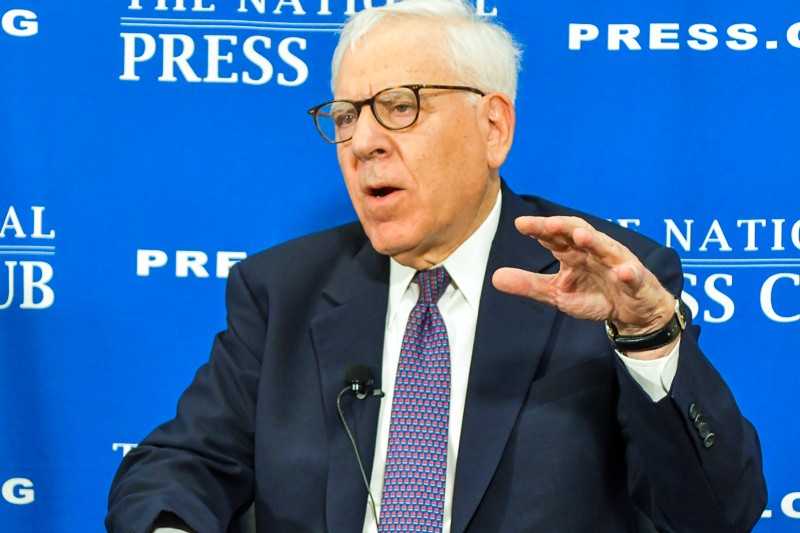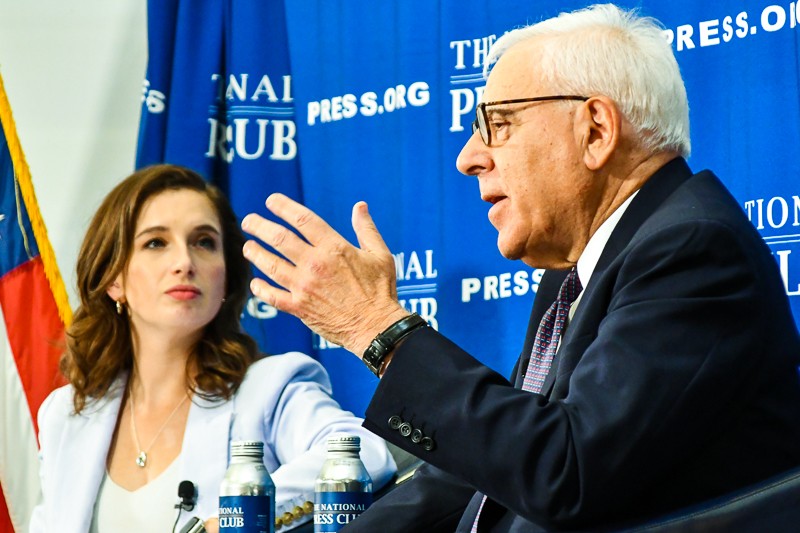Rubenstein: Trump’s presidential power brings early wins
President Donald Trump has tipped the scales of the three branches of government in his favor — and much of the country, and the markets, seem to be satisfied with it for now, David Rubenstein said Tuesday.
This situation is virtually unprecedented, though much remains to be seen on how Trump’s vastly expanded executive branch power will be viewed by historians, said Rubenstein, an investor, philanthropist, author and historian.
Rubenstein discussed his most recent book, "The Highest Calling: Conversations on the American Presidency," and his wide range of experience at a National Press Club Headliners Cocktails & Conversation event on Tuesday, July 8. The book summarizes and shares insights on his discussions with American presidents.

The public loves to watch interviews, said Rubenstein, who has been the interlocutor of many prominent people --including Trump on the eve of his first presidential run. The viewer can engage in both parts of a Q&A, listening to the question and hearing the answer.
"It's not a stilted speech," Rubenstein said. "And, so, the format took off.”
Rubenstein became enamored of the presidency early in his life. He recalled waving to John F. Kennedy as a young boy. He got involved with Jimmy Carter’s presidential campaign and later served in his administration, just a few years out of law school.
Rubenstein considered the weight and consequence of the office in the age of Trump through a largely unemotional lens.
“Presidents probably have more power than the Founding Fathers ever envisioned, but I don't know that today, if they were living today, they would say it's not a good thing,” Rubenstein said.
“It's very hard to run a country as big as ours, and have to get everything approved by Congress every single time,” he added. “President Trump, whatever you might think about him, he's got a leadership style that has worked for him.”
The GOP budget bill that Trump signed into law last Friday was unmatched for carrying virtually the president’s entire domestic policy agenda.

“He's got the ability to say certain things that other presidents probably wouldn't have said, or try things other presidents wouldn't have,” Rubenstein said.
Yet the country’s long-term path, including its growing debt, shrinking social mobility, and diminished standing in the world, remains a question mark, he said. Trump’s on-again-off-again tariffs have only injected uncertainty that hasn’t been fully priced in by the markets.
“We just don't know yet what the impact is because we don't really know what the tariffs are going to be,” he said. “Therefore, businesses haven't yet reset their pricing as much.”
Rubenstein, a co-founder and co-chairman of The Carlyle Group, one of the world’s largest private investment firms, denied that private equity firms that have bought up newspapers and gutted staff are to blame for the journalism industry’s financial woes.
“People just aren't reading them anymore — that's one of the problems,” Rubenstein said, who counted himself among people who do, in fact, still read newspapers.
Rubenstein, the chairman, CEO and principal owner of the Baltimore Orioles, also said Major League Baseball fans are probably craving “equilibrium” among the teams that have a lot of money to pay their players and smaller-market teams that don’t.
“You want the fans of all 30 cities or 30 teams that feel that at the beginning of the season they have a chance to win,” he said. “And right now, the polling data suggests that many people don't feel that.”
